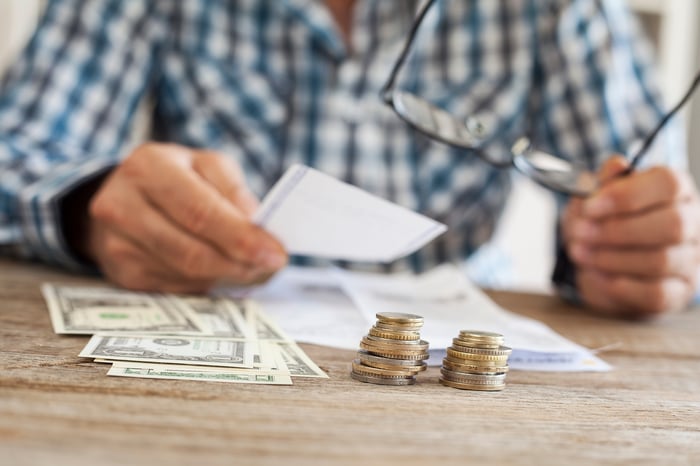Since this year's March lows, shares of Square (XYZ -0.02%) are up more than 500%. But one of the factors responsible for Square's stellar performance has been bitcoin, which not only misleads investors, but might also be driving the company's valuation to dangerous, un-earned heights.

Image source: Getty Images.
Bitcoin revenue
Square's business model consists of two ecosystems. First, it provides small and medium-sized businesses with all the tools they need to easily set up and run their shops. Second, it offers the Cash App, which started as a small peer-to-peer payments app, but over time has evolved into more of a one-stop-shop for all things consumer finance. In 2018, Square gave consumers using the Cash App the ability to easily trade bitcoin.
Any time a customer buys bitcoin on the cash app, Square generates money by charging a small fee on those transactions. However, because of accounting rules, Square is forced to recognize the entire transaction as revenue. Even though Square's making just a tiny sliver of the money changing hands -- it keeps less than 2% of bitcoin transactions as gross profit -- it's obliged to post revenue growth rates that don't reflect the actual performance of the underlying business. In its most recent quarter, Square's revenue grew 140% year over year. However, if you exclude bitcoin, revenue from the rest of the business only grew 25%.
Is Bitcoin revenue a good thing?
Despite those tiny margins on bitcoin purchases, investors should consider any additional functionality within the Cash App a net positive. Don't let the accounting overshadow the big picture: The more things that customers can do with the Cash App, the more reasons they have to sign up with and use it. In this case, bitcoin is helping Square acquire new customers and keep existing ones.
The goal for Square, in the end, is to get as much money on the Cash App as possible. The app will become more and more important to its users as Square continues to roll out different tools and features for it. This means that Square can further make money off its users through other features like the Cash Card or instant transfer. And pending the proper licenses, Square could eventually deploy, lend, or invest the money on its platform to earn greater returns. It has even begun testing this through small payday loans to a small group of consumers.
Overall, the most important metric moving forward is gross profit. This metric backs out the bitcoin volume and gives a realistic look at how Square's initiatives are progressing, before including any operating or capital expenditures. It also offers a decent view of users' actions within the cash app, irrespective of bitcoin trading.
In Square's most recent quarter, cumulative gross profit across both the Cash App and its business services grew by $294 million, or 59% year over year -- a significant acceleration from the year prior, where it only grew gross profit by $147 million.
While the seller ecosystem still makes up more than 50% of overall gross profit, it only grew gross profit by 12%, versus 212% gross profit growth from the cash app. So despite bitcoin trading somewhat artificially inflating Square's total revenue, the feature seems to be a useful customer acquisition tool, and it appears to be driving users' money into the app's other features as well.
Valuation
While bitcoin does seem to be a useful feature for Square as a whole, it still risks distorting the company's valuation if investors pay too much attention to revenue. My biggest concern is that if bitcoin falls out of favor, its trading volume could diminish. After all, nothing changes investor sentiment like price. A drop in trading volume could mean a plunge in revenue and potentially less usage of the Cash App as a whole. This makes it difficult to precisely calculate the lifetime value of anyone primarily using the Cash App to trade bitcoin.
As I stated earlier, shareholders are best off focusing on gross profit and making sure they don't overpay for Square's stock. That means balancing the stock's price-to-gross profit multiple with its overall growth rate for that gross profit.
Right now, Square trades at a price-to-gross profit ratio of 43, whereas a year ago it traded at 14. However, growth in total gross profit has also accelerated, so it shouldn't come as any surprise that investors are more enthusiastic now than a year ago. These two variables should demonstrate how both the business is progressing, and the price investors are willing to pay for the stock.





